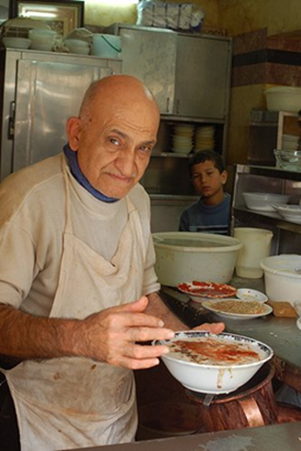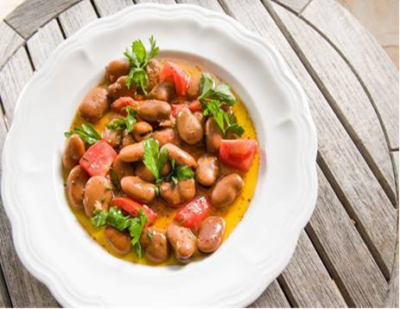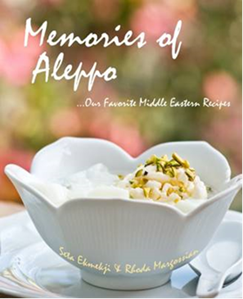LOS ANGELES — “Foul, fool, (or fūl) is an ancient Middle Eastern breakfast going back (some say) to Egypt of the 5th century BC. It was mentioned in the Talmud Yerushalmi, indicating it was used in Middle Eastern countries since the 4th century,” says Alec Ekmekji. “It is a beloved dish across the Levantine and Middle East region, and is a common part of the cuisines of Arab, Middle Eastern and African cultures. Ful medames is consumed as part of the Lent diet by the Christian communities in Arab countries. There are many restaurants that serve nothing but this dish in Aleppo, either for eat-in or take-out.”
In Syria, the dish is prepared in two basic ways: Foul Mdammas Bez-Zeit (fava beans with olive oil) and Foul Mdammas Bel-Laban (fava beans with yogurt). The “mdammas” or “medames” part (spellings vary) is said to refer to the way it is prepped and describes how it is “mashed” or “mixed” with other ingredients. This version is from the celebrated Memories of Aleppo, Our Favorite Middle Eastern Recipes published in August 2016 by Aleppo natives and authors Seta Ekmekji and Rhoda Margossian.
“Some writers have suggested that ful medames dated all the way back to <https://en.wikipedia.org/wiki/Ancient_Egypt> Ancient Egypt. Some evidence of the use of ful is a cache of 2,600 dried fava beans unearthed at a late Neolithic site on the outskirts of <https://en.wikipedia.org/wiki/Nazareth> Nazareth. This cooking method is mentioned in the <https://en.wikipedia.org/wiki/Jerusalem_Talmud> Jerusalem Talmud, indicating that the method was used in Horn of African and Middle Eastern countries since the fourth century.”**

A few years ago, Seta Ekmekji (Alec’s mother), and her sister-in-law, Rhoda Margossian decided to document their family’s recipes to leave to their children and grandchildren, a project that slowly developed into a life of its own, and turned into an impressive ethnic cookbook. “Memories of Aleppo is a collection of one family’s treasured recipes that can be made and enjoyed for many generations, including this recipe that perhaps is the best breakfast dish in the whole world,” adds Seta.
Aleppo, Rhoda says, can boast one of the richest, most diverse cuisines in the world. It is one of the oldest continuously inhabited cities in the world; it may have been inhabited since the 6th millennium BC. Excavations at Tell as-Sawda and Tell al-Ansari, just south of the <https://en.wikipedia.org/wiki/Old_city_of_Aleppo> old city of Aleppo, show that the area was occupied by <https://en.wikipedia.org/wiki/Amorites> Amorites by the latter part of the 3rd millennium BC.
Syrian cuisine as a whole is a fusion of foods from all around the Middle East. It consists mainly uses eggplant, zucchini, garlic, meat (mostly from lamb and sheep), sesame seeds, rice, chickpeas, fava beans, lentils, cabbage, cauliflower, vine leaves, pickled turnips, cucumbers, tomatoes, olive oil, lemon juice, mint, pistachios, honey and fruits. “Despite its wide acclaim, only a handful of Aleppo dishes are ever served at Middle Eastern restaurants today, including here in Los Angeles,” says Alec. “It remains an ancient cuisine of many enormously talented and gifted cooks and chefs.”










